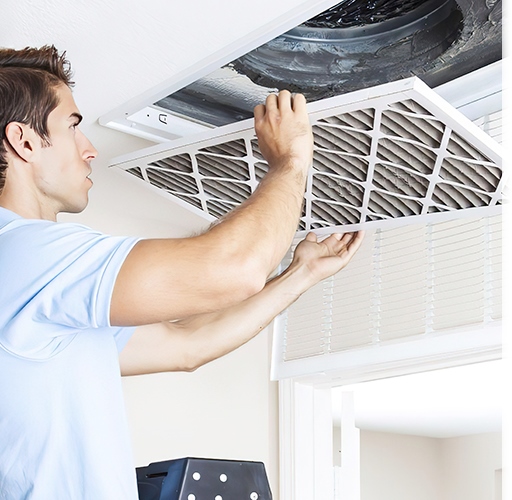AC Repair vs. Replacement? Find Out Today! | Strickland HVAC
Air conditioning systems are vital to modern homes and businesses, keeping occupants cool and comfortable during hot weather. However, air conditioners can break down or become less efficient like any complex mechanical system. When faced with a malfunctioning or inefficient AC unit, many wonder whether it’s better to repair or replace the system. This decision depends on several factors, including the unit’s age, the problem’s severity, and the cost of repair versus replacement. In this context, we’ll explore the cost of air conditioning repair vs. replacement to help you make an informed decision.
1. Factors Influencing
Cost of Repair vs. Replacement
A. Age of the Air Conditioner
The age of the air conditioning system is an important factor to consider when deciding whether to repair or replace it. Generally, air conditioners have a lifespan of 10-15 years, after which they may become less efficient and more prone to breakdowns. If your air conditioner is less than ten years old and in good condition, repairing it may be more cost-effective.
On the other hand, if your air conditioner is over ten years old and has required multiple repairs recently, replacing it may be the better choice, as older systems tend to be less energy-efficient and more prone to breakdowns. Additionally, newer air conditioning systems often come with advanced features and technologies that can improve comfort and energy efficiency, making replacement a wise investment in the long run.
B. Severity of the Problem
The severity of the problem with your air conditioning system is another important factor to consider when deciding whether to repair or replace it. Minor issues such as clogged filters or faulty thermostats can usually be fixed relatively cheaply. However, more significant problems, such as refrigerant leaks, compressor failures, or damage to the evaporator or condenser coils, can be more expensive to repair.
In some cases, the cost of repairs for a severe problem may be close to or even exceed the price of a new air conditioning system. In such cases, it is more cost-effective to replace the unit rather than invest in expensive repairs that only provide a temporary fix.
It’s important to note that delaying repairs or failing to address severe problems with your air conditioning system can lead to more extensive damage and higher repair costs down the line. If you suspect a severe problem with your air conditioning system, it’s best to consult a professional HVAC technician like us here at Strickland to assess the situation and provide guidance on the best course of action.
C. Brand and Model The brand and model of your air conditioning system can also influence the repair cost versus replacement. Some brands and models may be more expensive due to the availability and price of replacement parts or specialized expertise required for repairs.
Additionally, certain brands and models may have a reputation for being more reliable or durable, which could repair a more viable option. Conversely, if your air conditioning system has a history of frequent breakdowns or recurring problems, it may be more cost-effective to replace it with a more reliable brand or model.
The age of the air conditioning system is an important factor to consider when deciding whether to repair or replace it. Generally, air conditioners have a lifespan of 10-15 years, after which they may become less efficient and more prone to breakdowns. If your air conditioner is less than ten years old and in good condition, repairing it may be more cost-effective.
On the other hand, if your air conditioner is over ten years old and has required multiple repairs recently, replacing it may be the better choice, as older systems tend to be less energy-efficient and more prone to breakdowns. Additionally, newer air conditioning systems often come with advanced features and technologies that can improve comfort and energy efficiency, making replacement a wise investment in the long run.
B. Severity of the Problem
The severity of the problem with your air conditioning system is another important factor to consider when deciding whether to repair or replace it. Minor issues such as clogged filters or faulty thermostats can usually be fixed relatively cheaply. However, more significant problems, such as refrigerant leaks, compressor failures, or damage to the evaporator or condenser coils, can be more expensive to repair.
In some cases, the cost of repairs for a severe problem may be close to or even exceed the price of a new air conditioning system. In such cases, it is more cost-effective to replace the unit rather than invest in expensive repairs that only provide a temporary fix.
It’s important to note that delaying repairs or failing to address severe problems with your air conditioning system can lead to more extensive damage and higher repair costs down the line. If you suspect a severe problem with your air conditioning system, it’s best to consult a professional HVAC technician like us here at Strickland to assess the situation and provide guidance on the best course of action.
C. Brand and Model The brand and model of your air conditioning system can also influence the repair cost versus replacement. Some brands and models may be more expensive due to the availability and price of replacement parts or specialized expertise required for repairs.
Additionally, certain brands and models may have a reputation for being more reliable or durable, which could repair a more viable option. Conversely, if your air conditioning system has a history of frequent breakdowns or recurring problems, it may be more cost-effective to replace it with a more reliable brand or model.
2. Advantages and Disadvantages of Repair vs. Replacement
There are advantages and disadvantages to repairing and replacing an air conditioning system. Here are some of the key factors to consider:
Benefits of repairing an air conditioning system:
Benefits of repairing an air conditioning system:
- Lower upfront cost compared to replacement
- Repairs can often be completed quickly, minimizing downtime without cooling
- You can keep using your existing air conditioning system, which may have sentimental or aesthetic value
- If your system is relatively new and still under warranty, repairs may be covered at little or no cost to you
Disadvantages of repairing an air conditioning system:
- Repairs may only provide a temporary fix, and additional repairs may be necessary for the future
- If your system is old and inefficient, it may not be worth investing in expensive repairs that only offer a short-term solution
- Repair costs can add up over time, and it may be more cost-effective to replace the system with a newer, more efficient model
- Repairs may not address underlying problems with your air conditioning system, such as ductwork issues or inadequate insulation, which can lead to ongoing inefficiency and discomfort.
- Benefits of replacing an air conditioning system:
- A new system is likely to be more energy-efficient, resulting in lower energy bills over time
- A new system may come with a warranty, providing peace of mind and protection against future repair costs
- Advanced features and technologies in newer systems can lead to improved comfort and air quality
- If your system is old and inefficient, a replacement can provide long-term savings and improved reliability.
- Disadvantages of replacing an air conditioning system:
- Higher upfront cost compared to repairs
- Installation may require significant time and disruption to your home or business
- Some older buildings may require modifications to accommodate newer air conditioning systems
- If your existing system has sentimental or aesthetic value, replacing it may not be desirable.

Ultimately, deciding to repair or replace your air conditioning system will depend on your circumstances. Our professional technicians at Strickland Heating and air can provide guidance and advice to help you make an informed decision.

